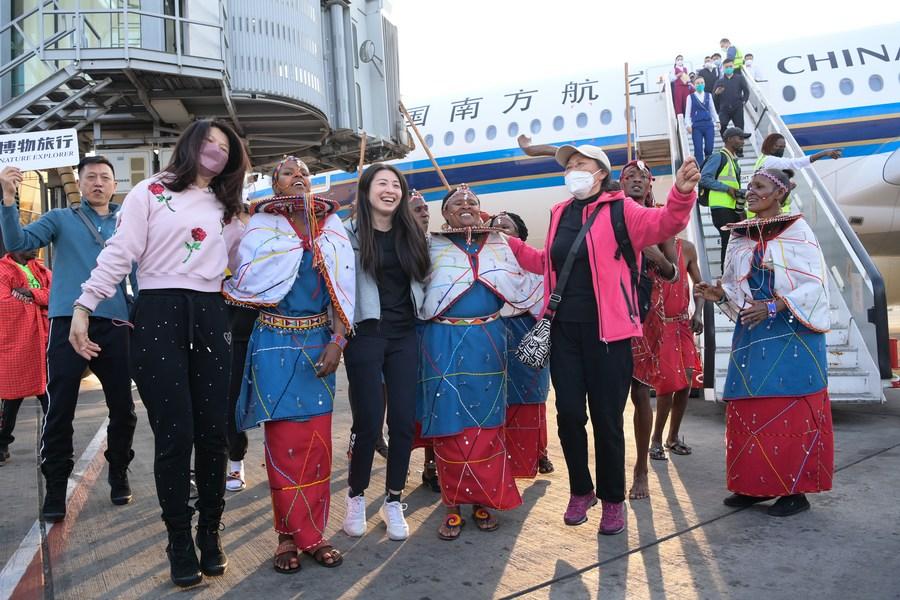By Stephen Ndegwa
That China and Kenya's relations are a benchmark of steadfast ties both in Africa and globally is not in doubt. The strategic partners have ignored distractions undertaken through misinformation by certain global spheres, and unapologetically entrenched and grown their formal relations for decades now.
Indeed, the ties that bind China and Kenya are deep-rooted, dating back more than 600 years ago when Zheng He, the great navigator of the Chinese Ming Dynasty, set foot on the eastern coast of Kenya. China was among the first countries to establish diplomatic relations with the Republic of Kenya a couple of days after the latter's independence on December 12, 1963. In 2017, Chinese President Xi Jinping and then Kenyan President, Uhuru Kenyatta, upgraded the bilateral relations to a Comprehensive Strategic Cooperative Partnership.
The meeting in October between Kenya's President William Ruto and his Chinese counterpart, Xi Jinping, during the third Belt and Road Forum for International Cooperation in Beijing underscored the importance of both partners to one another. On July 22, President Ruto and Chinese Foreign Minister Wang Yi had set the stage when the latter made an official visit to Nairobi, Kenya's capital, with both sides pledging to deepen Belt and Road cooperation.
For decades, China has been one of Kenya's major trading partners in Africa and a major source of Foreign Direct Investment (FDI). Data from the Kenya Investment Authority published in September shows that FDI from China to Kenya currently stands at $348 million, which the government plans to increase by 10 percent. These investments have been crucial in growing Kenya's Gross Domestic Product and offering thousands of direct and indirect jobs to Kenyan youth.
In following up on China's promise of opening its vast market wider to foreign traders and investors, the Kenya National Chamber of Commerce and Industry (KNCCI), the country's trade lobby, recently opened an office in Changsha, capital of China's Hunan Province. KNCCI has an estimated 600 exporters on its database, who are expected to take advantage of this window by showcasing their products and seeking investment opportunities. Moreover, the members will benefit from capacity building and visits to modern factories in China.
In 2021, China's net exports to Kenya included machines, textiles and metals. Conversely, Kenya's net exports to China included mineral products, vegetable products, and animal hides. In between, there are hundreds of products moving both ways daily, a lifeline for millions of citizens in the two countries.
It has been six decades of unswervingly supporting each other in safeguarding their national sovereignty and territorial integrity, safeguarding their legitimate rights and interests, and exploring development paths suited to their national conditions. None of the two countries are looking for validation from any external party. The partners understand they live in a world with a shared future, even though they practice different political, social, and economic ideologies. That is the height of mutual respect and win-win cooperation.

Chinese tourists interact with Maasai performers at Jomo Kenyatta International Airport in Nairobi, Kenya, February 11, 2023. [Photo/Xinhua]
The tightening of ties between China and Kenya has been both by design and by default. From independence, China saw Kenya's rising star and, as a fast-developing country itself, decided to support the former's national development. Reeling under shifting goalposts disguised as aid conditions, Mwai Kibaki, Kenya's former president and architect of Vision 2030, the East African country's development blueprint, declared that it was time to look to the East for more realistic and empathetic development aid partners.
In the last two decades, China has been instrumental in helping Kenya to fast-track its infrastructural development as part of both bilateral and multilateral ties. Some of the iconic mega Chinese funded and constructed infrastructural projects include the Thika Superhighway, the Standard Gauge Railway (SGR), the Nairobi Express Way, the Port of Mombasa, and the ongoing Lamu Port-South Sudan-Ethiopia Transport (LAPSSET) corridor. These projects are also a core component of China's intercontinental Belt and Road Initiative.
Culturally and politically, the chemistry between the two partners has created exemplary rapport. China and Kenya have shared significant people-to-people exchanges in several fields, with thousands on either side experiencing what the other has to offer in, among others, education, tourism, tours, and conferences. This has created mutual understanding and amity.
An international symposium held this year under the theme, "Comparative Study of Chinese and African Civilizations", convened by the China-Africa Institute and the Chinese Academy of History noted the establishment of policy, connectivity, and intellectual frameworks that are currently promoting arts and culture between the two partners.
In the words of President Xi Jinping in his congratulatory letter to the third Dialogue on Exchanges and Mutual Learning among Civilizations and the first World Conference of Sinologists held in July, "cultural exchanges will transcend estrangement, mutual learning will transcend clashes, and coexistence will transcend feelings of superiority so that human civilizations can make progress."
Neither country interferes with the internal affairs of the other. While the West has criticized China's stance for allegedly overlooking the perceived ills of its partners in negotiating and offering development aid, the Asian giant has suffered immensely from the West's meddling. No amount of blindsiding will create a wedge between China and Kenya relations.
The author is a special commentator on current affairs for CGTN.

 中文
中文



